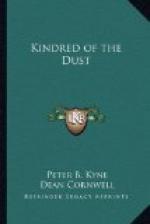As a man grows old he grows kindlier; those things which, at middle age, appear so necessary to an unruffled existence, frequently undergo such a metamorphosis, due to the corroding effects of time, that at eighty one has either forgotten them or regards them as something to be secretly ashamed of. Thus it was with Nan’s grandfather. His pride and dignity were as austere as ever, but his withered heart yearned for the love and companionship of one of his own blood; now that Caleb Brent was dead, the ancient martinet forgot the offense which this simple sailor had committed against the pride of a long line of distinguished gentlemen, members of the honorable profession of arms. He thought it over for a month, and then wrote the only child of his dead daughter, asking her to come to him, hinting broadly that his days in the land were nearly numbered and that, in the matter of worldly goods he was not exactly a pauper.
Having posted this letter the old admiral waited patiently for an answer, and when this answer was not forthcoming within the time he had set, he had telegraphed the postmaster of Port Agnew, requesting information as to her address. This telegram the postmaster had promptly sent over to Nan and it was for the purpose of replying to it that she had gone to the telegraph office on the day when Fate decreed that Jane and Elizabeth McKaye should also be there.
After her return to the Sawdust Pile that day Nan’s thoughts frequently adverted to the Biblical line: “The Lord giveth and the Lord taketh away.” Certainly, in her case, He appeared to be working at cross purposes. At a time when she had resigned herself to domestic labor in order to avoid starvation, her aristocratic, arrogant, prideful grandfather had seen fit to forgive her dead father and offer her shelter from the buffets of the world; yet, even while striving, apparently to be kind, she knew that the reason underlying his invitation was plain, old-fashioned heart-hunger, a tender conscience and a generous admixture of human selfishness. She smiled bitterly at his blunt hint of a monetary reward following his demise; it occurred to her that the stubborn old admiral was striving to buy that which he might have had for a different asking.
She read the admiral’s letter for the twentieth time—and from the thick white page her glance went to her child. Would he be welcome in that stern old sea dog’s home? Would his great-grandfather forget the bar sinister of little Don’s birth and would her own misfortune be viewed by him with the tenderness and perfect understanding accorded her by old Caleb? She did not think so; and with the remembrance of her dead father, the flames of revolt leaped in her heart. He had been loyal to her and she would be loyal to him. No, no! She was not yet prepared to come fawning to the feet of that fierce old man who had robbed her father of his happiness. What right had he to expect forgiveness, sans the asking, sans an acknowledgment of his heartlessness?




